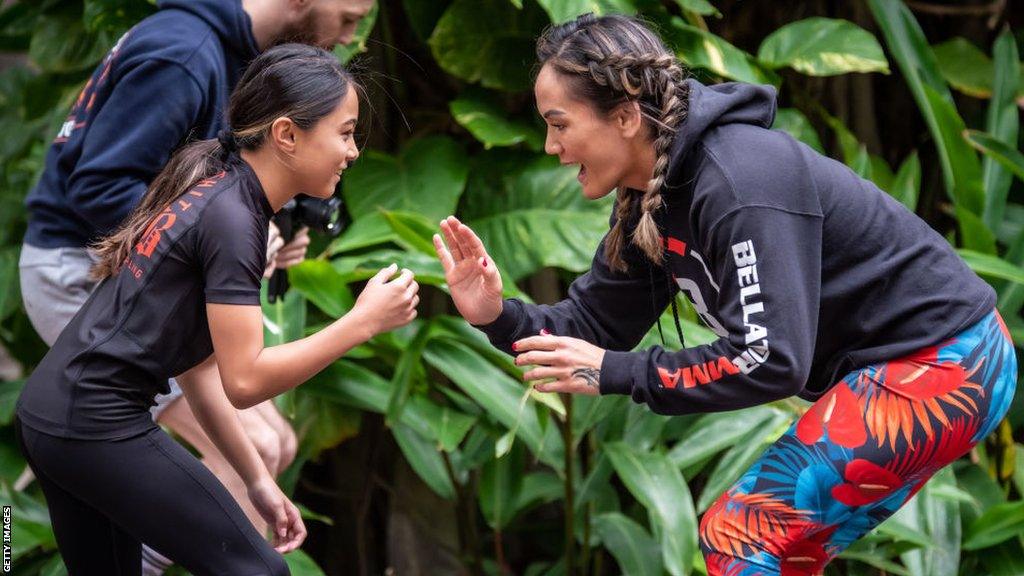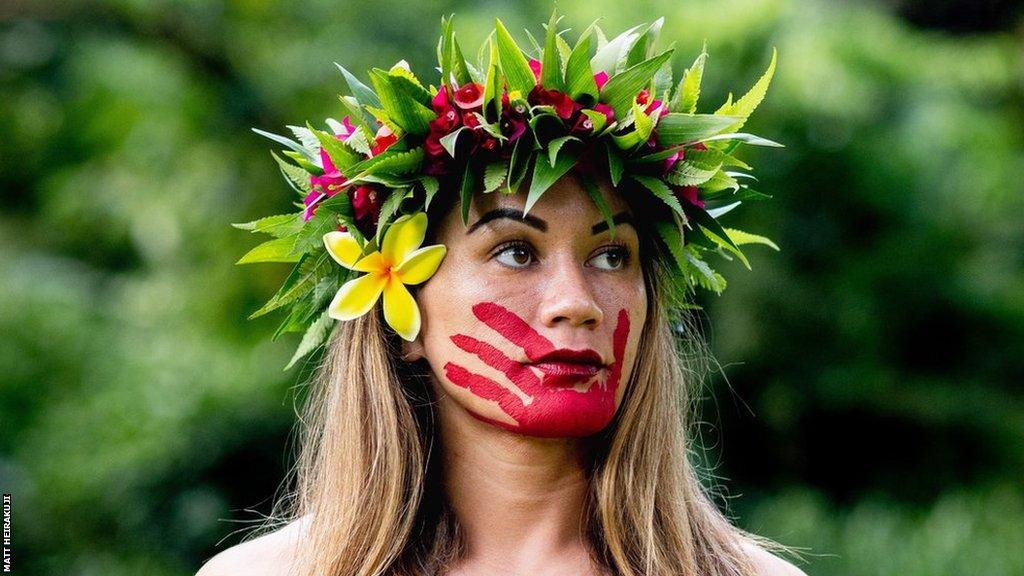Bellator 295: Ilima-Lei Macfarlane's fighting career motivated by desire to give voice to indigenous women
- Published
Ilima-Lei Macfarlane: Bellator flyweight motivated to give indigenous women a voice
Bellator 294 and 295 in Hawaii |
|---|
Venue: Neal S. Blaisdell Arena, Honolulu Dates: Friday, 21 and Saturday, 22 April |
Coverage: Live coverage on BBC iPlayer and the BBC Sport website and app for Bellator 294 at 01:30 BST (Saturday), with Bellator 295 at 01:00 (Sunday). |
Warning: This article contains an account of sexual abuse.
Ilima-Lei Macfarlane holds back tears when she describes what legacy she wants to leave in MMA.
"I'm gonna get emotional now, I can feel it coming. I want to make my parents proud, my loved ones, and to leave a positive impact for Hawaii, Hawaiians and our native girls," she tells BBC Sport.
Macfarlane's achievements in Bellator, where she became flyweight champion in 2017 and held the title for more than three years, is something to be proud of, but it is her work outside the cage which she hopes defines her career.
Macfarlane, 33, runs a non-profit organisation called the Na Wahine Toa Foundation, which translates from her native Hawaiian to English as 'Women Warriors'.
The foundation was born in 2017 when Macfarlane was made aware of the level of violence against indigenous women in the United States and Canada, called Missing and Murdered Indigenous Women [MMIW].
Indigenous women and girls are 10 times more likely to be murdered than women from other ethnic groups in the United States, according to a study published in 2018., external
On Saturday night (early Sunday, UK time), Macfarlane faces Kana Watanabe at Bellator 295 in Hawaii, and she is using the bout to raise awareness of the issue.
"Native women and girls disproportionately face higher rates of violence than any other demographic and the same holds true for native Hawaiian girls," says Macfarlane.
"So I started teaching self defence. I was like, 'I'm going to teach these women how to fight back'.
"Yes, stranger danger is a problem, but 80% of violence against women is actually perpetrated by someone they know.
"[The foundation] focuses on self-defence, but I also want to focus on recognising red flags in relationships, self-empowering these women and little girls, and finding their voices so they can love themselves and respect themselves enough so they won't accept mistreatment.
"It definitely changed the course of my career because now I see what I'm meant to do post-fighting and I see the bigger fight that takes place out of the cage."

Ilima-Lei Macfarlane (right) defended the Bellator title four times during her reign when she was champion
'There is a reason I was drawn to this epidemic'
Macfarlane was initially drawn to helping fellow Hawaiian women after discovering the statistics surrounding their mistreatment, but she also relates to the issue.
While at school, Macfarlane alleges she was sexually abused by one of her old basketball coaches, Dwayne Yuen.
In 2020, she filed a lawsuit against the school for failing to take action over years of alleged abuse. That civil case was settled out of court in 2021.
Then in February this year, Yuen was arrested by the FBI, external and charged with a single count of possessing child pornography.
Prosecutors allege he is "a prolific and aggressive child predator". Yuen has denied the charge.
"[The abuse] was something that I did push away, but after doing the internal work and the therapy, it kind of came out that there was a reason that I got in to fighting," Macfarlane says of her own experience.
"Why I decided to get into a male-dominated sport and fight against the patriarchy. And there was a reason why I was drawn to this [indigenous women] movement.
"The timing of everything was pretty crazy. This happened almost 20 years ago with the basketball coach, and it resurfaced. We had to make a decision: 'Are we going to try and fight this again?' And we did.

Macfarlane is a record-breaker in Bellator being the only female fighter with 11 wins in the MMA promotion
"It is 100% linked to the work I'm doing, and directly linked to MMIW, because all of his victims were native Hawaiian."
Macfarlane worked with the FBI for 10 months leading up to Yuen's arrest.
"It was very long because I was like 'Uh, I see this guy, on trips with girls, I want to say something' but I couldn't until the investigation was done," she said.
"I like to joke that I could work for the FBI, because I was sending them any piece of evidence I was getting.
"It was well worth it for him being handcuffed and led away by the feds."
'Keep Hawaiian lands in Hawaiian hands'
Macfarlane moved to California around the age of 19 and is part of the 79% of Hawaiians who don't live in the state., external
A slogan on one of her T-shirts reads 'Keep Hawaiian lands in Hawaiian hands', which Macfarlane says stems from a popular song on the islands.
The slogan refers to the difficulties Hawaiians face in affording to live there, with tourism spots and a number of US military bases taking up land.
"We are facing a land and housing crisis here in Hawaii. We can't even live in our own home," said Macfarlane.
"The two biggest products of colonisation has been tourism and the military. And land is being used for those two driving forces.
"Let Hawaiians be the caretakers of the land. It's a huge problem Hawaiians are facing. We are being priced out of paradise.
"Even though I live in California now, this is the place I truly feel is home. And I'll come back one day; it's going to happen."
Should Macfarlane beat Watanabe, she has said she will call for a title shot against the winner of champion Liz Carmouche and DeAnna Bennett's bout on Friday.
But Macfarlane, who is a former champion with 12 wins from 14 fights over an eight-year career, says the title is not important at this stage of her career.
"I've already tasted gold and it was great, but I am fighting for bigger things outside of the cage right now," she said.
"While regaining the belt right now would be awesome, I don't know if I have it in me to maintain it.
"It doesn't matter if I'm the champion or not because that doesn't define me."
If you have been affected by issues raised in this article, there is information and support available on BBC Action Line.